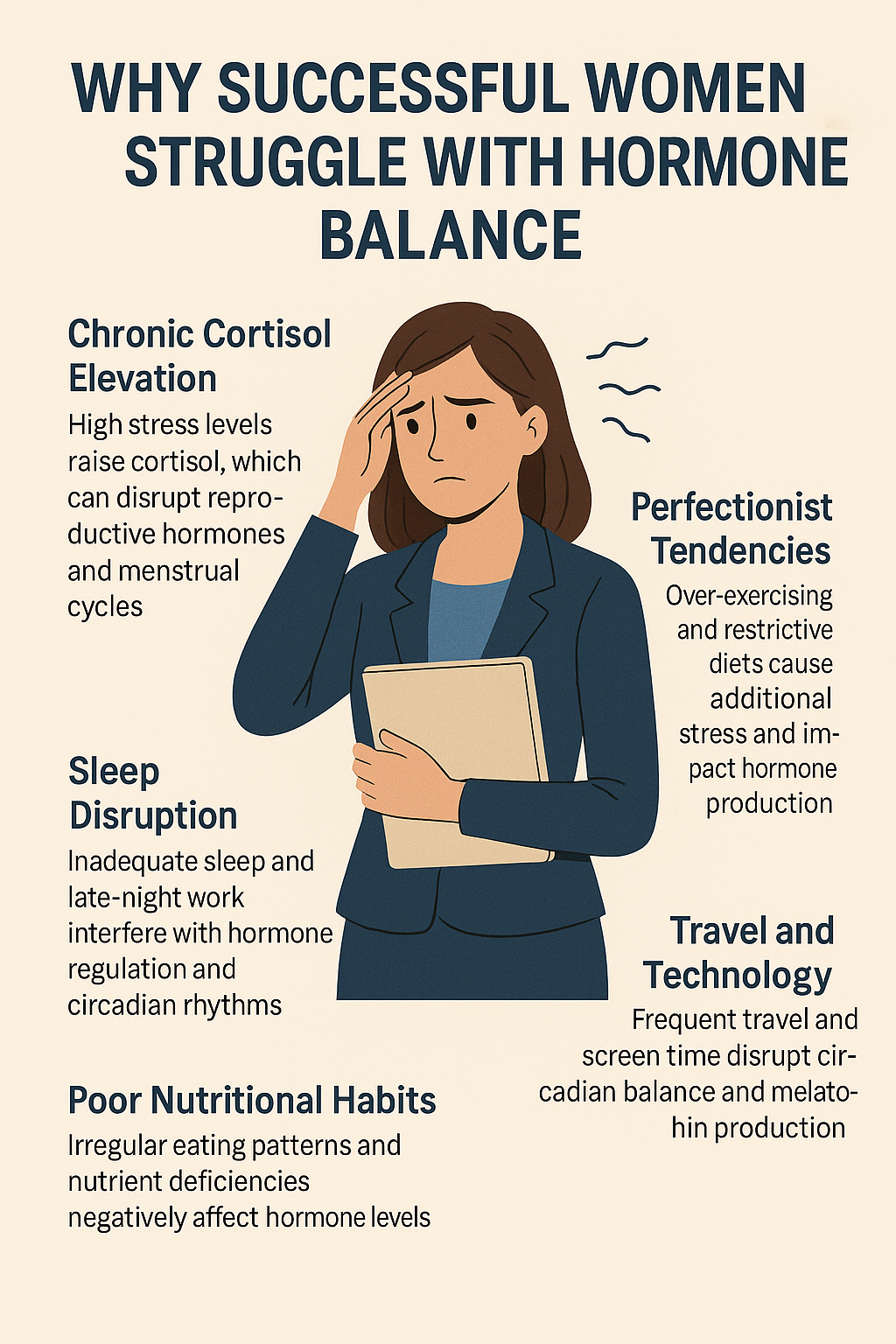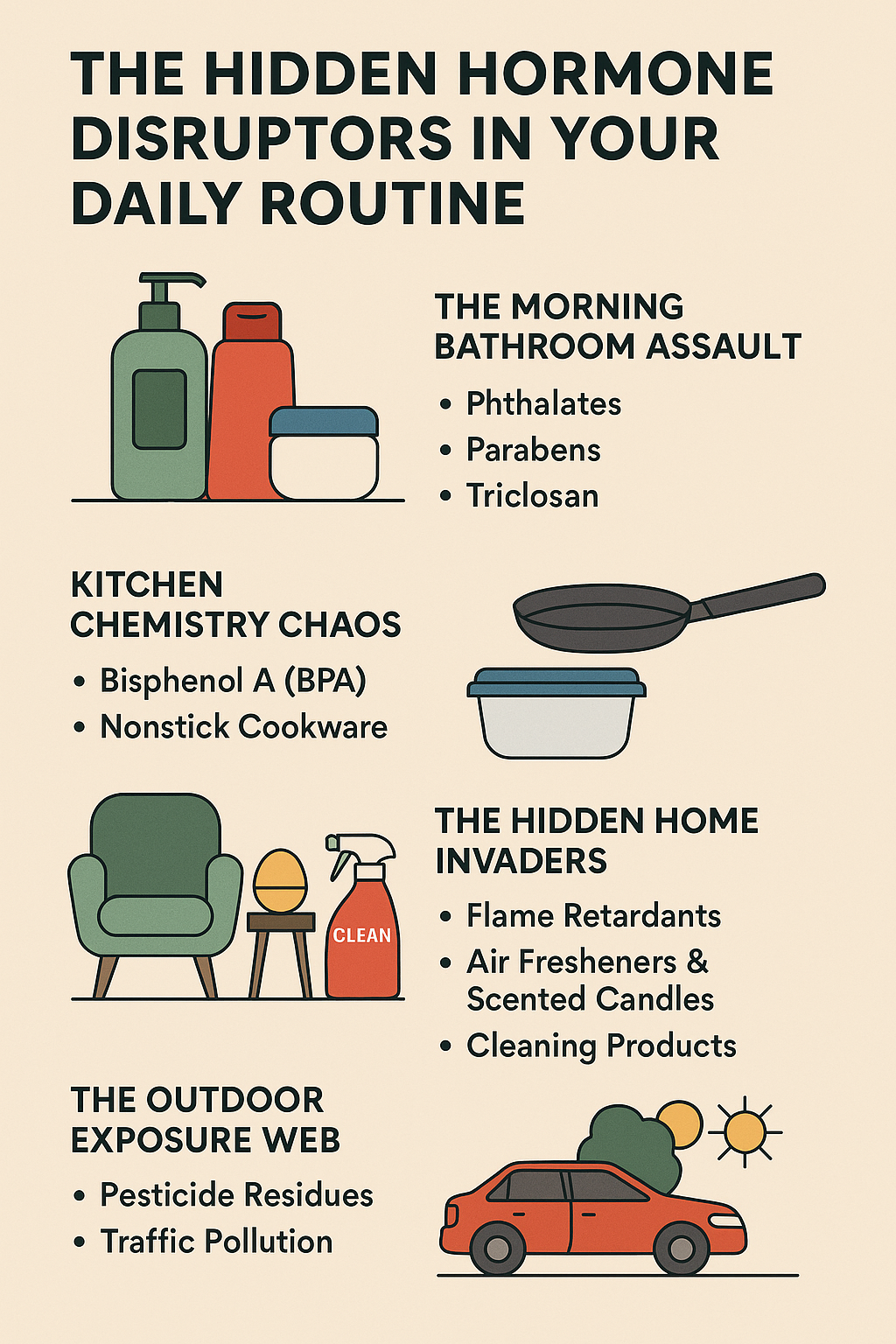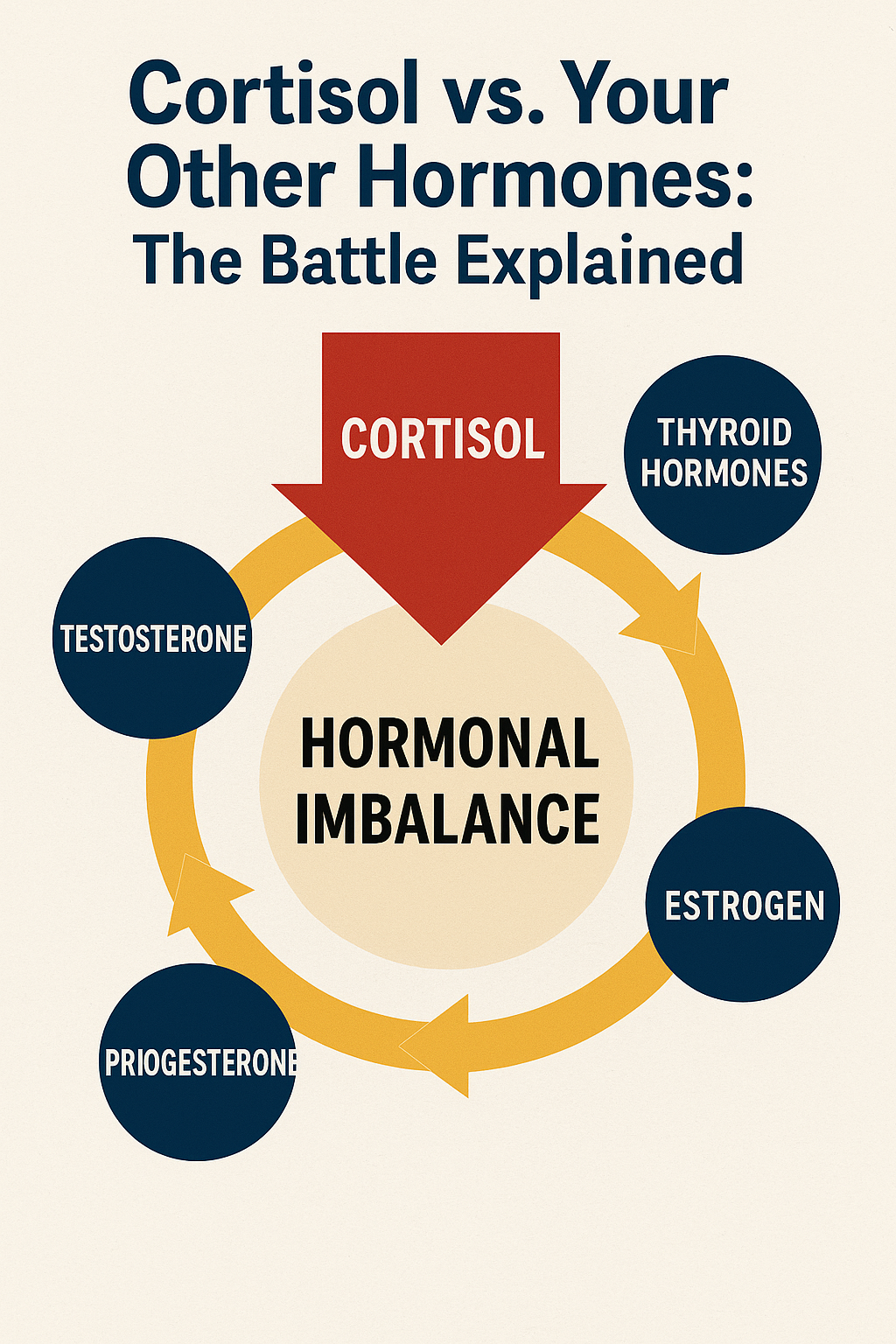
Why Successful Women Struggle with Hormone Balance
She's crushing it in the boardroom, leading her team to record-breaking results, and somehow still manages to volunteer at her daughter's school fundraiser. From the outside, she has it all together. But behind closed doors, she's battling exhaustion that sleep can't fix, weight that won't budge despite her disciplined diet, and a monthly cycle that feels more like a roller coaster than a natural rhythm.
If this sounds familiar, you're not alone. High-achieving women across industries are discovering that the very traits and lifestyle patterns that fuel their professional success may be working against their hormonal health. The ambitious drive, perfectionist tendencies, and relentless pace that propel careers forward can create a perfect storm for endocrine disruption.
Understanding why success and hormonal balance often seem mutually exclusive isn't about accepting this as an inevitable trade-off. It's about recognizing the specific challenges successful women face and developing strategies that honor both professional ambitions and biological needs.
The High-Achiever's Hormonal Perfect Storm
Success in today's competitive landscape often requires characteristics that, while professionally advantageous, can be hormonally taxing. The combination of chronic stress, irregular schedules, and the constant pressure to perform creates a cascade of hormonal disruptions that compound over time.
Chronic Cortisol Elevation sits at the heart of many successful women's hormonal struggles. When you're constantly in "go mode"—managing teams, making crucial decisions, solving problems—your adrenal glands pump out cortisol as if you're perpetually facing a life-or-death situation. While this stress hormone helps you power through deadlines and high-pressure meetings, chronically elevated cortisol disrupts the delicate dance between your other hormones.
Cortisol's relationship with your reproductive hormones follows a hierarchy system where survival trumps reproduction. When your body perceives constant stress, it prioritizes cortisol production over estrogen and progesterone synthesis. This shift can lead to irregular cycles, PMS symptoms, low libido, and difficulty conceiving—issues that many successful women dismiss as "normal" parts of a busy life.
The Perfectionist's Paradox
The perfectionist mindset that drives professional excellence often extends to health and wellness, creating additional stress rather than relief. Many high-achieving women approach their health with the same intensity they bring to work projects, leading to restrictive eating patterns, excessive exercise routines, and an all-or-nothing mentality that actually worsens hormonal imbalances.
Over-exercising is particularly common among successful women who view intense workouts as both stress relief and a way to maintain control. However, excessive high-intensity exercise combined with already elevated stress levels can further spike cortisol, suppress thyroid function, and disrupt reproductive hormones. The "more is better" mentality that serves well in career advancement can backfire when applied to fitness.
Restrictive eating patterns often accompany the perfectionist approach to health. Skipping meals during busy workdays, following extremely low-calorie diets, or eliminating entire food groups can signal famine to your body, triggering survival mechanisms that slow metabolism and disrupt hormone production. Your body interprets restriction as stress, adding another layer to an already overburdened system.
The Sleep Sacrifice Syndrome
"I'll sleep when I'm dead" might be the unofficial motto of ambitious women, but chronic sleep deprivation wreaks havoc on every aspect of hormonal health. Quality sleep isn't just recovery time—it's when your body produces growth hormone, regulates insulin sensitivity, and maintains the circadian rhythms that govern your entire endocrine system.
Most successful women operate on insufficient sleep while consuming caffeine to maintain performance levels. This pattern disrupts the natural cortisol rhythm, where levels should peak in the morning and gradually decline throughout the day. Instead, caffeine keeps cortisol artificially elevated while disrupting the deep sleep stages necessary for hormonal restoration.
Insulin sensitivity also suffers from sleep deprivation, making it harder to maintain stable blood sugar levels. This creates a vicious cycle where poor sleep leads to increased cravings for quick energy sources, blood sugar spikes and crashes, and further hormonal disruption. Many successful women find themselves caught in this pattern without realizing the connection between their 5 AM emails and their afternoon energy crashes.
The Travel and Technology Toll
Modern success often requires extensive travel and constant connectivity, both of which disrupt the circadian rhythms essential for hormonal balance. Crossing time zones regularly confuses your body's internal clock, affecting everything from cortisol production to melatonin release.
Blue light exposure from screens compounds this issue. Many successful women work late into the evening on devices, exposing themselves to blue light that suppresses melatonin production and signals to the brain that it's still daytime. This disruption affects not only sleep quality but also the timing of other hormonal releases throughout the night.
Irregular meal timing due to travel and demanding schedules further disrupts metabolic hormones. When you're grabbing airport food, skipping meals during back-to-back meetings, or eating dinner at 10 PM after a long work day, your body struggles to maintain stable insulin levels and proper digestive hormone signaling.
The Hidden Cost of Constant Connectivity
The pressure to be always available—responding to emails at all hours, taking calls during family time, and mentally processing work problems even during supposed downtime—means that many successful women never truly "turn off." This constant low-level stress keeps the nervous system in a state of activation that prevents the deep restoration necessary for hormonal balance.
Decision fatigue is another underrecognized factor. High-level positions require making numerous decisions throughout the day, and research shows that decision-making depletes mental resources and increases stress hormones. By evening, many successful women feel simultaneously wired and exhausted—a state that makes quality sleep nearly impossible.
The Nutrition Paradox of Success
Ironically, many successful women who can afford the highest quality foods and supplements often have the poorest nutritional habits due to time constraints and stress eating patterns. The combination of irregular meal timing, reliance on convenient foods, and stress-induced cravings creates a nutritional environment that doesn't support optimal hormone production.
Micronutrient deficiencies are common among high-achieving women, particularly in nutrients crucial for hormone synthesis like magnesium, zinc, B vitamins, and omega-3 fatty acids. Despite having access to quality nutrition, the demands of success often mean grabbing whatever is convenient rather than what's nourishing.
Blood sugar instability from irregular eating patterns and high stress levels creates a cascade of hormonal reactions. When blood sugar spikes and crashes throughout the day, it triggers cortisol release and insulin resistance, further disrupting the delicate balance of reproductive hormones.
The Social and Relationship Impact
Success often comes with social sacrifices that indirectly affect hormonal health. Irregular schedules make it difficult to maintain consistent social connections, and the pressure to maintain a professional image can create isolation even in crowded rooms.
Chronic loneliness and lack of meaningful social connections have been shown to increase inflammation and stress hormones. Many successful women report feeling lonely despite being surrounded by colleagues and clients, as professional relationships rarely provide the deep connection necessary for emotional wellbeing.
Relationship stress often increases as career demands intensify. Whether it's tension with a partner who feels neglected, guilt about missing family events, or the challenge of dating while maintaining a demanding career, relationship stress adds another layer to an already complex hormonal picture.
The Age Factor: When Perimenopause Meets Peak Career
Many women reach their career peaks during their 40s and early 50s—precisely when perimenopause begins to affect hormone levels. The combination of naturally declining estrogen and progesterone with the stress of high-level responsibilities creates a perfect storm for hormonal chaos.
Perimenopause symptoms like brain fog, sleep disruption, and mood swings can feel particularly threatening to women who pride themselves on mental acuity and emotional control. Many successful women push through these symptoms rather than addressing them, fearing that acknowledging hormonal changes might be perceived as weakness in professional settings.
Redefining Success to Include Hormonal Health
The path forward isn't about choosing between success and hormonal balance—it's about redefining what sustainable success looks like. This requires a fundamental shift in how high-achieving women approach their health, moving from a reactive, quick-fix mentality to a proactive, systems-based approach.
Strategic stress management becomes as important as strategic business planning. This means identifying which stressors are truly necessary for professional goals and which are simply habits that can be modified. It also means building recovery time into schedules with the same intentionality used for important meetings.
Boundary setting isn't just about work-life balance—it's about protecting the biological rhythms that support optimal hormone function. This might mean establishing tech-free hours before bed, scheduling meals like important appointments, or saying no to commitments that don't align with both professional and health goals.
The Compound Effect of Small Changes
Successful women often expect dramatic results from dramatic actions, but hormonal healing typically requires consistent, sustainable changes rather than extreme overhauls. The compound effect of small, daily choices—prioritizing protein at breakfast, taking walking meetings when possible, or implementing a consistent bedtime routine—often produces more lasting results than drastic lifestyle changes.
Energy management becomes as crucial as time management. This means recognizing that hormonal health directly impacts cognitive performance, decision-making ability, and leadership effectiveness. Investing in hormonal balance isn't separate from professional success—it's foundational to sustainable high performance.
Creating a New Model
The most successful women of the future will be those who recognize that optimal performance requires optimal hormonal health. This doesn't mean slowing down or lowering professional standards—it means developing systems and strategies that support both ambitious goals and biological needs.
By understanding the specific ways that success-driven behaviors impact hormonal health, high-achieving women can make informed choices about where to make adjustments. The goal isn't to eliminate stress or ambition, but to create a sustainable framework where professional success and hormonal balance can coexist.
Your hormones aren't obstacles to overcome on the path to success—they're sophisticated messengers providing valuable information about what your body needs to perform at its best. Learning to listen to and work with these signals, rather than against them, may be the ultimate competitive advantage in building a truly successful and sustainable career.


